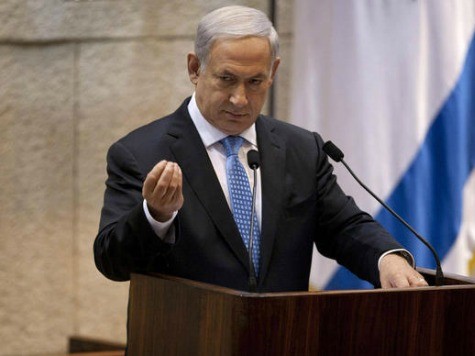Prime Minister Benjamin Netanyahu called Sunday’s deal in Geneva on Iran’s nuclear program a “historic mistake,” ruining what U.S. President Barack Obama might have hoped would be a global chorus of relief. Clearly, the U.S. had anticipated Israel’s negative reaction, with Secretary of State John Kerry stating in Geneva that critics of the deal would bear “responsibility to tell people what the alternative is.”
Israel’s answer: UN Security Council resolutions 1696, 1737, 1747, 1803, 1835, and 1929, all of which demand that Iran suspend all nuclear enrichment. These were a rare and powerful international consensus. Most of those resolutions were legally binding under international law, passed under Chapter VII of the UN Charter. Most of the resolutions were also unanimous. Yet the major powers–the five permanent members of the Security Council, plus Germany–agreed to retreat to a position allowing some enrichment by Iran.
In practical terms, Israel’s position meant tightening economic sanctions until Iran agreed to stop all enrichment, while holding out military action as a last resort. The Israelis perceived that Iran was desperate to make a deal. “The economic pressure on Iran would have led to a much better agreement that would have dismantled Iran’s nuclear capability,” an Israeli official in the prime minister’s office was quoted as saying.
However, the Obama administration was even more desperate, and clearly would have signed anything. It was eager to back a weaker deal in Geneva two weeks ago. That agreement collapsed when France emerged–as it did in Mali, Libya, and Syria–as the leader, refusing to agree to what it called a “sucker’s deal.”
The current, interim deal is a modest improvement. It includes the reactor at Arak, which will be prevented from becoming operational and producing plutonium that could be used for weapons. It will also dispose of Iran’s more highly-enriched uranium stockpile, and stops short of recognizing what Iran calls its “right” to nuclear enrichment. Yet, like the deal that failed two weeks ago, it leaves most of Iran’s centrifuges intact.
It will now be almost impossible to enforce the deal with the threat of military action, with President Barack Obama stating bluntly Saturday evening that “only diplomacy can bring about a durable solution to the challenge posed by Iran’s nuclear program.” At the same time, it will be almost impossible to restore the sanctions once they are rolled back. For its part, Iran believes all sanctions will be lifted in a final deal.
Some observers have described the deal as a “capitulation” by Iran. Anshel Pfeffer, who covered the talks for Israel’s left-wing Ha’aretz newspaper, said that Iran had given in on major points and that Netanyahu’s reaction against the agreement “may actually convince the Iranians that they got a good deal.” He said that Iranian journalists who had applauded Iran’s foreign minister were privately disappointed in the terms.
Viewed in comparison to the deal that was almost signed two weeks ago, the actual deal might appear very good. Yet viewed in comparison to the UN Security Council resolutions, the Geneva agreement is, in fact, very bad. It also secures Iran’s position as a regional power, even as it continues to help the Assad regime murder civilians in Syria. Indeed, Iran was finally admitted to separate talks in Geneva this week on Syria’s fate.
Israel, which was not a participant in the Geneva nuclear talks, viewed them through the lens of Jewish history. In 1938, the great powers concluded the Munich agreement, in which the fate of Czechoslovakia was sealed, while Czechoslovakia itself was not represented. That same year, the Evian conference failed to find a solution to the problem of Jewish refugees, effectively condemning Europe’s Jews to die in the Holocaust.
There was no Israel then. The state was created in 1948 with a vow never to let Jews be so vulnerable again. That is why Netanyahu declared that it would not be bound by the agreement in Geneva, and why even doves like Shimon Peres, a vocal supporter of Obama, were reluctant to praise the deal. Israel is effectively alone now–barring a possible secret alliance with the Saudis–and has few options left, all of them bad.

COMMENTS
Please let us know if you're having issues with commenting.